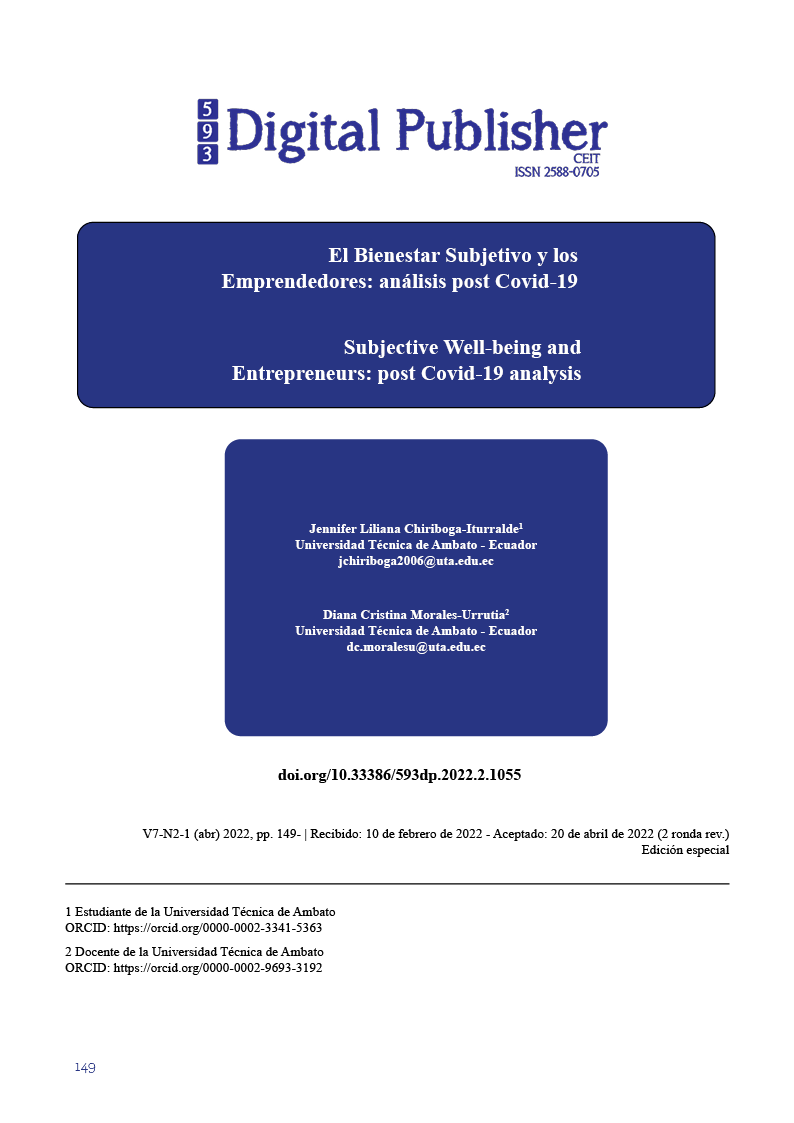Subjective Well-being and Entrepreneurs: post Covid-19 analysis
Main Article Content
Abstract
The authors presented the relationship between the subjective well-being of entrepreneurs and the internal facto-res of entrepreneurship, post world pandemic by Covid-19. Initially, documen-tary and bibliographic research was used for the independent analysis of the concepts and com-ponents of the variables. Among these, it can be highlighted that happiness is a term that is close-ly linked to subjective well-being, being positive emotions, a primary characteristic that derives from this term. The main findings of subjective well-being in entrepreneurs after the pandemic were the successful response that some entrepreneurs implemented in their administrative pro-cesses to cope with the health emergency; another key point was the opportunity for constant training, taking advantage of the confinement time.
The measurement instrument helped to determine the relationship between variables. With re-spect to the results, the authors applied the statistical method of Spearman's correlation coeffi-cient, reaching the conclusion that the subjective well-being of the entrepreneurs is not affected by the internal factors that occurred in the company, post the Co-vid-19 pandemic.
Downloads
Article Details

This work is licensed under a Creative Commons Attribution-NonCommercial-ShareAlike 4.0 International License.
1. Derechos de autor
Las obras que se publican en 593 Digital Publisher CEIT están sujetas a los siguientes términos:
1.1. 593 Digital Publisher CEIT, conserva los derechos patrimoniales (copyright) de las obras publicadas, favorece y permite la reutilización de las mismas bajo la licencia Licencia Creative Commons 4.0 de Reconocimiento-NoComercial-CompartirIgual 4.0, por lo cual se pueden copiar, usar, difundir, transmitir y exponer públicamente, siempre que:
1.1.a. Se cite la autoría y fuente original de su publicación (revista, editorial, URL).
1.1.b. No se usen para fines comerciales u onerosos.
1.1.c. Se mencione la existencia y especificaciones de esta licencia de uso.
References
Bryant, F., & Veroff, J. (1984). Dimensions of subjetive mental healt in americanmen and women. . Journal of Personality and Social Psychology, 543-673.
Casas, J., Repullo , J., & Donado, J. (28 de Enero de 2002). Unidad do Centem . Obtenido de http://www.unidaddocentemfyclaspalmas.org.es/resources/9+Aten+Primaria+2003.+La+Encuesta+I.+Custionario+y+Estadistica.pdf
Chiavenato, I. (2009). Administración de Recursos Humanos. Colombia: McGraw hill. Obtenido de http://www.untumbes.edu.pe/vcs/biblioteca/document/varioslibros/Administraci%C3%B3n%20de%20recursos%20humanos.%20Chiavenato.pdf
Díaz , G. (2001). El bienestar subjetivo: Actualidad y perspectivas. Rev Cubana de Medicina General Integral, 17(6), 572-579. Obtenido de http://scielo.sld.cu/scielo.php?script=sci_arttext&pid=S0864-21252001000600011
Diener, E. (1984). Subjective Well-Being. Psychological Bulletin, 95(3), 542-575. Obtenido de file:///C:/Users/Compuedit/Downloads/DienerSWB2000.pdf
Duarte, T., & Tibana, M. (2009). Emprendimiento, una opción para el desarrollo. Scientia Et Technica, XV(43), 326-331. Obtenido de https://www.redalyc.org/pdf/849/84917310058.pdf
García Martín, M. (2002). El Bienestar Subjetivo. Escritos de psicología(6), 18-39. Obtenido de https://dialnet.unirioja.es/servlet/articulo?codigo=281674
Hernández Sampieri , R., Fernández Collado , C., & Baptista , M. (2014). Metodología de la investigación. Santa Fe: McGRAW-HILL.
Johnson, María; Saletti, Lorena; Tumas, Natalia. (05 de Junio de 2020). Emociones, preocupaciones y reflexiones frente a la pandemia del COVID-19 en Argentina. Ciëncia & Saúude Colectiva, 25(1), 2447-2456. doi:https://doi.org/10.1590/1413-81232020256.1.10472020
Kantis, H., & Federico, J. (2021). Resiliencia y reinvención de los emprendedores latinoamericanos en el contexto del impacto provocado por la pandemia. Inter-American Development Bank, 32.
Koury, J., & Hirschhaut, M. (2020). Reseña histórica del COVID-19 Cómo y por qué llegamos a esta pandemia? Acta Odontológica Venezonala, 22. Obtenido de https://www.actaodontologica.com/ediciones/2020/especial/art-2/
Lasio , V., Amaya, A., Zambrano, J., & Ordeñana, X. (2020). Global Entrepreneurship Monitor Ecuador 2019/2020. ESPAE, Escuela de Negocios de la ESPOL. Quito: BABSON . Obtenido de https://www.espae.edu.ec/wp-content/uploads/2021/02/GEM_Ecuador_2019.pdf
Ministerio de Salud Pública. (29 de Febrero de 2020). MSP. Obtenido de https://www.salud.gob.ec/actualizacion-de-casos-de-coronavirus-en-ecuador/#:~:text=El%2029%20de%20febrero%20de,la%20coordinaci%C3%B3n%20de%20la%20emergencia.
Montorio , I., & Izal, M. (1992). Bienestar psicológico en la vejez. . Revista de Gerontología, 145-154.
Mora Pabón, R. (2011). Estudio de Actitudes emprendedoras con profesionales que crearon empresa. Revista Escuela de Administración de negocios., 3(71), 70-83. Obtenido de https://www.redalyc.org/pdf/206/20623157006.pdf
Observatorio de Calidad de Vida y Salud Social (OCVS). (4 de Octubre de 2021 ). Observatorio de Calidad de Vida y Salud Social . Obtenido de https://www.uv.mx/ocvs/que-es-el-bienestar/componentes-bienestar-subjetivo/#:~:text=El%20Bienestar%20Subjetivo%2C%20es%20posible,es%20decir%2C%20c%C3%B3mo%20lo%20perciben.
Organización Mundial de la Salud. (15 de Marzo de 2020). OMS . Obtenido de https://www.who.int/es/emergencies/diseases/novel-coronavirus-2019
Queipo, B., & Useche, M. C. (2002). El desempeño laboral en el departamento de mantenimiento del Ambulatorio la Victoria. Revista de Ciencias Sociales, III(3), 1-12. Obtenido de https://www.redalyc.org/pdf/280/28080308.pdf
Rachinger, M., Rauter, R., Müller, C., Wolfgang, V., & Schirgi, E. (2018). Digitalization and its influence o business model innovation . Emerald insight, 18. Obtenido de https://www.emerald.com/insight/content/doi/10.1108/JMTM-01-2018-0020/full/pdf?title=digitalization-and-its-influence-on-business-model-innovation
Reyna, R., García del Junco , J., & Álvarez, P. (2007). Características del emprendedor de éxito en la creación de pymes españolas. Estudios de Economía aplicada, 25(3), 951-974. Obtenido de https://www.redalyc.org/pdf/301/30113818017.pdf
Rodríguez , A. (2009). Nuevas perspectivas para entender el emprendimiento empresarial. Pensamiento & Gestión, 4(26), 94-119. Obtenido de http://www.scielo.org.co/scielo.php?script=sci_arttext&pid=s1657-62762009000100005
Ryff, C. (1989). Happiness is everything, or is it? Explorations on the meaning of Psychological well-being. Personality and Social Psychology, 13.
Unruh , G., & Kiron, D. (2017). Digital transformation on purpose. MIT Sloan Management. Obtenido de https://sloanreview.mit.edu/article/digital-transformation-on-purpose/
Useche, M. C., Pereira, M., & Barragán, C. (2021). Retos y desafíos del emprendimiento ecuatoriano, transcendiendo a la pospandemia. Revista de Ciencias de la Administración y Economía, 16.
Valle, T., Sánchez, A., Vayas , T., Mayorga, F., & Freire, C. (2021). Empresas y Establecimientos en Tungurahua. Ambato: Observatorio Económico y Social de Tungurahua. Obtenido de https://blogs.cedia.org.ec/obest/wp-content/uploads/sites/7/2021/08/Empresas-y-establecimientos-en-Tungurahua.pdf
Vargas, G., & Sánchez , J. C. (2021). Efecto del Liderazgo sobre el Bienestar Subjetivo del Emprendedor. Journal of Exact Sciences and Technological Applications JESTA, 1, 1-11. Obtenido de https://periodicos.ufsm.br/JESTA/article/view/41071/43014



